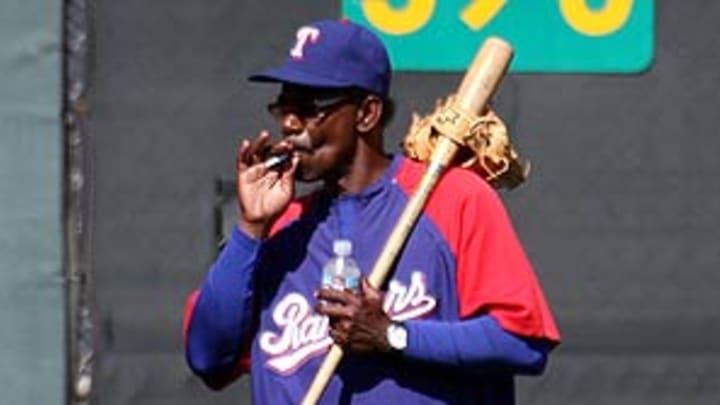Players vow to support Washington

Washington's answer -- the same as 10 other teammates, all of whom had signed one-year deals in 1986 (and all of whom would rankle the union) -- was yes.
"I don't think we have one ounce of a problem," Washington said then, "but things have gotten so out of hand that we'll prove it to the public by being tested. I don't want to do it but I don't have anything to hide. All they're going to find in me is a couple of beers."
So many years later, of course, they found more. At 10:30 Wednesday morning, following a report by SI.com's Jon Heyman, the entirety of the Rangers roster assembled in their clubhouse here as Washington admitted that in the first half of the 2009 season (he wouldn't publicly say when, or under what circumstances) he had used cocaine and then failed a random drug test. The test was a urinalysis that is part of a testing regimen for non-playing personnel that was subtly re-implemented in 2008, one of the recommendations from the Mitchell Report. Washington had voluntarily informed MLB about his use before taking the test, and then warned team executives. He is the first manager in baseball history known to have tested positive for cocaine or a recreational drug.
After the team's clubhouse meeting -- in which a handful of players like veteran All-Star Michael Young stood up and voiced their support for Washington -- the long walk then began, with some 30 players marching out of the room and past the fans and families and smiling attendants on the outfield concourse, crowding into a meeting room behind left field.
Washington's prepared remarks before the assembled press might have set a standard for public contrition: "I am not here to make excuses"; "I've learned about myself personally, and I recognize that this episode was an attempt to dodge personal anxieties and personal issues that I needed to confront"; "Right after that test, I told [general manager] Jon Daniels and [president] Nolan Ryan about my shameful behavior, and I offered them my resignation"; "Remarkably, these two men, after a lot of thought and prayer, allowed me to stay here through last season"; and, lastly, "I'm so sorry for what I did."
Just two weeks earlier, Washington noted, he had also completed MLB's mandatory drug treatment program -- involving tests at least three times a week -- and then pledged to re-enter it of his own volition, with one hope in mind: that he could cut down any suspicion about perhaps his most vital claim, that he used cocaine "the one and only time," which just so happened to be the time he was randomly caught.
Such a hope is likely too much to ask for now. Yes, Washington is generally well-liked by both players ("We support him 100 percent," says Young, the team's de facto leader) and the media (he was hugged by a few beat writers on his way into the 11 a.m. news conference). Yes, he is a hard-working, blunt and otherwise upstanding baseball man (complete with a ubiquitous red-and-white box of Winstons at the ready). But to see the potential lasting damage of a manager testing positive for cocaine -- the drug once seen as a prime threat to baseball, as Washington himself knows from his playing days -- one need only have heard the searching pauses and seen the awkward grimaces engraved on the faces of Daniels and Ryan, the two men who had in private declined to punish him.
Do the general manager and president really believe that this was the one time Washington, a 57-year-old man, had slipped and used the drug? Said Ryan: "Yes...MLB felt it was a one-time incident."
Does this affect Washington's hope for a contract extension (the one-year option on his contract was exercised shortly before the positive test)? Said Ryan: "Obviously we're concerned, and this is a factor."
Did the team seriously consider changing managers when Washington informed them of the incident last year? Said Daniels: "We're human. We considered all possibilities."
And what did they make of the manager's most suspicious -- and admirably honest -- statement of all, when he was asked if this was the only time he'd used drugs and he replied, "The drug that we are talking about, yes"? Said Daniels, at perhaps the apex of his discomfort: "Any group of people...when you're younger...people make mistakes."
So they do. As Washington spoke, Josh Hamilton -- the most famous reformed crack-cocaine addict in sports today -- sat in the very last row in the seat all the way to the right, wearing a stylized, proverb-adorned black t-shirt ("THEY WILL FLY HIGH ON WINGS OF ANGELS"). Last summer the married, devoutly Christian outfielder admitted to a now-infamous lapse of his own when unseemly photos from the previous offseason of him with young women in a Tempe bar shot a hole in the story of his comeback from drug abuse. Hamilton was drunk, shirtless and occasionally covered in whipped cream; he, too, then told and apologized to Rangers brass in private before the pictures leaked to Deadspin.com months later.
"Our stories are nothing alike," Hamilton said in the clubhouse this afternoon. "I was addicted to drugs...He made one mistake, and he manned up to it. We're going to love him and support him."
The Rangers players, in fact, have spent the day trying on a new "us against the world" mentality, first broached in that private clubhouse speech by Young on Wednesday and repeated by his teammates since. Just as they did with Hamilton last year -- indeed, just as baseball did in the mid-1980's -- they have all resolved to come out of the shadow of drugs stronger than ever, the well-worn hope that there is nothing more to hide riding on the latest guarantee.
